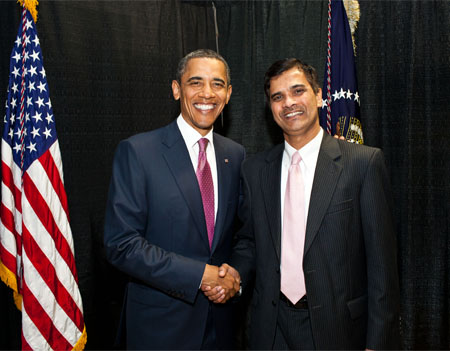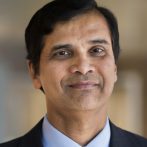ME Professor Sridhar Kota has brought his extensive product development expertise to bear in Washington, D.C. For the past two years Kota has been serving the White House Office of Science and Technology Policy as assistant director for advanced manufacturing. In addition to coordinating advanced manufacturing research and development and devising policy recommendations and strategies to enhance U.S. competitiveness, Kota has been instrumental in shaping a number of initiatives. One of those efforts is the Advanced Manufacturing Partnership (AMP), which President Obama announced at Carnegie Mellon University in June 2011.
Advanced manufacturing refers to the use of information technology or other new technologies in the manufacture of new or emerging products as well as the use of advanced processes during the manufacture of existing products.
In fall 2009, when the President’s Council of Advisors on Science and Technology, or PCAST, began working on a report on American leadership in advanced manufacturing, Kota responded to the Council’s many and varied questions about challenges and opportunities. He prepared background information and case studies that addressed topics such as trade imbalances and the need for public-private partnerships to mature emerging technologies and ensure manufacturing readiness.

President Obama personally thanks Sridhar Kota for his contributions.
Kota made the case for a strong innovation policy to strengthen our country’s manufacturing base. “The ‘invent it here, manufacture it there’ approach to innovation that we’ve seen in past decades simply is not economically sustainable,” he said. Using examples from the past three decades, he conveyed how failing to manufacture today’s advanced technology products puts our ability to innovate next-generation products at tremendous risk.
Government has traditionally invested in basic research, and it must continue to do so in order to feed our innovation pipeline with new scientific discoveries, Kota explained. But while discovery is vital, it is not sufficient to compete in today’s global economy.
Kota’s work laid the foundation for a key recommendation from the PCAST: to launch an advanced manufacturing initiative to support innovation through applied and translational research programs for promising new technologies and public-private partnerships around broadly-applicable and pre-competitive technologies—all to close the gap between research and manufacturing. Several new initiatives including the AMP were born.
“The Advanced Manufacturing Initiative is a direct outgrowth of the intellectual leadership Professor Kota provided to the PCAST. The nation owes him a debt of gratitude for his dedication and hard work,” said Professor Rosina Bierbaum, a PCAST member and dean of the U-M School of Natural Resources and Environment.
“Professor Kota has brought clear vision around advanced manufacturing and played a key role in shaping the nation’s program to revitalize this critical sector of our economy,” added Dr. Eric Lander, PCAST co-chair. “He’s been a great asset and resource.”
Dr. Shirley Ann Jackson, PCAST member and president of Rensselaer Polytechnic Institute, agrees. “Sridhar played a key role in PCAST’s development of the Advanced Manufacturing report by researching key issues as well as identifying technological opportunities and different ways to weigh the importance to the United States of advanced manufacturing tied to R&D.”
In announcing the AMP, President Obama said, “If we want a robust, growing economy, we need a robust, growing manufacturing sector.” The President also announced a National Robotics Initiative, a multi-agency initiative that Kota helped orchestrate, and other initiatives including an Open Manufacturing Initiative from the Defense Advanced Research Projects Agency and an Innovative Manufacturing Initiative from the U.S. Department of Energy. And that’s good news, he says. “Between invention and manufacturing, you have innovation through translational research and engineering. Support for those is what we need to take our ideas and turn them into home-grown products.”
Momentum has been building for other federal advanced manufacturing initiatives as well, and Kota will continue his involvement in a number of related efforts in the Detroit area in order to leverage the region’s unique manufacturing resources.
